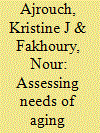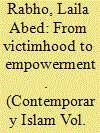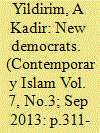|
|
|
Sort Order |
|
|
|
Items / Page
|
|
|
|
|
|
|
| Srl | Item |
| 1 |
ID:
121886


|
|
|
|
|
| Publication |
2013.
|
| Summary/Abstract |
The purpose of this study was to provide a critical perspective on the needs of aging Muslims by focusing on a diverse group of older adults including those with ancestry from African American, South Asian, Arab, and Albanian origins. Four focus group discussions were conducted with adults aged 60+ recruited from four Muslim centers in the metro-Detroit area. Grounded analysis uncovered themes related to needs, strengths and challenges in the Muslim community, as well as suggestions for the way forward in addressing aging issues. Needs identified include quality of life and social relations. Strengths included references to tradition and scripture. Challenges named referred to conflict both within and outside of the family. Finally, the way forward consisted of the desire for options to support aging families within the community, often in small steps, though not necessarily only through mosques. Findings also suggested that women may be a key agent of change within the Muslim community. In sum, this study uncovered areas of overlap and at times disagreement between and within groups, underlining the fact that there is no one kind of Muslim aging, and that any approach to caring for Muslims must combine cultural sensitivity with flexibility in order to minimize anxiety and stress for both elders and their families.
|
|
|
|
|
|
|
|
|
|
|
|
|
|
|
|
| 2 |
ID:
121882


|
|
|
|
|
| Publication |
2013.
|
| Summary/Abstract |
This study features the voices of women who sued their husbands in the Shari'a courts, revealing the empowerment that resulted from learning their legal rights. The stories of some two hundred Palestinian Muslim women who appealed to the Shari'a courts in Jerusalem and Taibe during the years 2000-2003 formed the basis of this study. The women came to the courts to claim material support (nafaqa) from their husbands and to demand child support (hadane). Four major reasons why these women sued their husbands in court emerged from their stories, revealing familial, social, economic and even political circumstances that impinged on their lives.
|
|
|
|
|
|
|
|
|
|
|
|
|
|
|
|
| 3 |
ID:
121883


|
|
|
|
|
| Publication |
2013.
|
| Summary/Abstract |
This article is an ethnographic account of the Social Section of Arabic language Islam Online. It focuses on what Krüger has called the 'hidden knowledge' of religious websites. Drawing on longitudinal fieldwork in the Islam Online offices in Cairo, Egypt, this article brings forth and analyzes rich data about Islam Online employees' work practices and meaning-making activities. Drawing on an organizational ethnographic approach, this article highlights new aspects of this influential Islamic website. More specifically, the author employs Linde's concept of an 'institutional narrative' to conceptualize and analyze the strong institutional identity and corporate values that are in play in everyday work practices. Focusing on key tropes such as 'the message', 'professional', 'pluralistic', and 'pioneers', the article demonstrates how Islam Online's Islamist institutional narrative includes a creation story and set of organizational values that play out in the execution of work tasks. Moreover, the author argues that the objective of the emic concept of "the message" is to contribute to both self- and societal-reform in the Arab world, and that Islam Online's own work environment represents a micro-cosmos of this ideal.
|
|
|
|
|
|
|
|
|
|
|
|
|
|
|
|
| 4 |
ID:
121884


|
|
|
|
|
| Publication |
2013.
|
| Summary/Abstract |
I analyze the positive and leading role religious actors play in democratic consolidation in Turkey in recent years. I argue that major social changes might lead to such outcomes. Empirically, I show that two major religious actors in Turkey-the Gulen Movement and the Justice and Development Party (AKP)-have adopted favorable positions on EU membership, ethnic and religious minorities, and pluralism in the last decade. This remarkable transformation owes its existence to the economic liberalization reforms initiated in the early 1980s, and the "post-modern coup" of 1997. This transformation reflects the need of both religious actors for greater democracy from a purely self-interested perspective. The Gulen Movement prefers an open and democratic system to sustain its organizational existence. The AKP responds to the preferences of its own constituency. These unique conditions have made two religious actors catalysts of democratization along with some liberal democrats in Turkey. Empirically, I rely on European Union's Turkey progress reports and a recent analysis of religious Turkish media to support the argument.
|
|
|
|
|
|
|
|
|
|
|
|
|
|
|
|
| 5 |
ID:
121885


|
|
|
|
|
| Publication |
2013.
|
| Summary/Abstract |
This article critically engages with recent theoretical writing on the anthropology of secularism by way of studying the perceptions and consciousness of those whom I name 'militant laic actors' in Turkey. Beginning with their key conviction that the present Government of the Justice and Development Party (AKP) possesses a hidden mission to Islamize the country, I argue that rather than relating to the actual policies of the AKP, such a conviction reflects the mood and emotions of laic actors. This perception is not without a social context. It relates to both the enlarged political power of the AKP and to the relative thwarting of social agency experienced by militant laic actors. The paper concludes by noting certain insufficiencies in both Charles Taylor's and Talal Asad's work as frameworks for explaining the dynamics of secularism while making a case for the significance of the Turkish situation in contributing to wider debates in the anthropology of secularism.
|
|
|
|
|
|
|
|
|
|
|
|
|
|
|
|
|
|
|
|
|